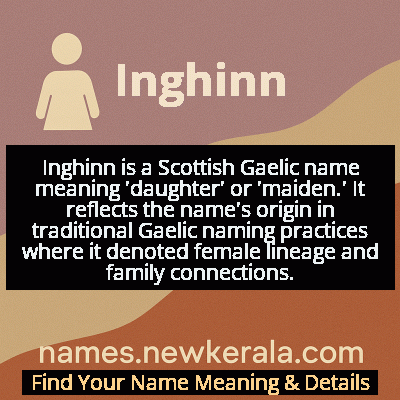Inghinn Name Meaning & Details
Origin, Popularity, Numerology Analysis & Name Meaning of Inghinn
Discover the origin, meaning, and cultural significance of the name INGHINN. Delve into its historical roots and explore the lasting impact it has had on communities and traditions.
Name
Inghinn
Gender
Female
Origin
Scottish
Lucky Number
3
Meaning of the Name - Inghinn
Inghinn is a Scottish Gaelic name meaning 'daughter' or 'maiden.' It reflects the name's origin in traditional Gaelic naming practices where it denoted female lineage and family connections.
Inghinn - Complete Numerology Analysis
Your Numerology Number
Based on Pythagorean Numerology System
Ruling Planet
Jupiter
Positive Nature
Optimistic, inspirational, and creative.
Negative Traits
Scattered, exaggerating.
Lucky Colours
Yellow, gold, purple.
Lucky Days
Thursday.
Lucky Stones
Yellow sapphire.
Harmony Numbers
1, 2, 9.
Best Suited Professions
Arts, writing, communication.
What People Like About You
Creativity, optimism.
Famous People Named Inghinn
Inghinn of Moray
Scottish noblewoman
Daughter of King Lulach of Scotland, played significant role in medieval Scottish nobility
Inghinn ingen Donnchada
Gaelic princess
Daughter of King Donnchad mac Briain, mentioned in Irish annals for her royal lineage
Inghinn Amhlaoibh
Historical figure
Recorded in Gaelic genealogies as daughter of important clan leaders
Name Variations & International Equivalents
Click on blue names to explore their detailed meanings. Gray names with will be available soon.
Cultural & Historical Significance
Many historical records from the 11th to 14th centuries document women bearing this name or its variations, particularly among noble families where precise genealogical recording was crucial for maintaining claims to lands and titles. The name embodies the Celtic tradition of honoring family connections and preserving ancestral memory through naming practices. In modern times, the name represents a connection to Scottish Gaelic heritage and serves as a symbol of cultural preservation and identity for families seeking to maintain their linguistic and historical ties to the Highlands and Islands.
Extended Personality Analysis
Women named Inghinn are often perceived as embodying traditional Scottish values of loyalty, family devotion, and cultural pride. They tend to be deeply connected to their heritage and family history, often serving as keepers of family traditions and stories. Their personality is frequently characterized by a strong sense of identity and belonging, combined with quiet determination and resilience. Inghinns are typically seen as nurturing figures who value relationships and community bonds, reflecting the name's literal meaning of 'daughter' and its connotations of family connection.
They often display a practical wisdom and emotional intelligence that makes them natural peacemakers and counselors within their social circles. While they may appear reserved initially, they possess inner strength and conviction, particularly when defending their loved ones or principles. Their connection to tradition doesn't preclude adaptability, as they often skillfully balance respect for the past with engagement in the present. The name suggests someone who is grounded, reliable, and deeply connected to their roots, while also capable of navigating modern complexities with grace and wisdom.
Modern Usage & Popularity
In contemporary times, Inghinn is primarily used as a traditional name within Scottish Gaelic-speaking communities and by families seeking to honor their Celtic heritage. While not common in mainstream naming trends, it has seen a modest revival as part of the broader Gaelic language and cultural renaissance in Scotland. The name is most frequently encountered in the Scottish Highlands and Islands, particularly among families actively engaged in preserving Gaelic traditions. Modern usage often involves combining it with more familiar middle names to balance tradition with practicality. The name's rarity outside Gaelic circles makes it a distinctive choice for parents seeking a name with deep cultural roots and historical significance. Recent years have shown increased interest in such traditional Gaelic names as part of cultural preservation efforts, though it remains relatively uncommon compared to more popular Scottish names like Isla or Eilidh.
Symbolic & Spiritual Meanings
Symbolically, Inghinn represents continuity, heritage, and the enduring bonds of family. As a name meaning 'daughter,' it embodies the concept of legacy and the transmission of cultural values across generations. It symbolizes the importance of female lineage in preserving family identity and traditions. The name carries connotations of purity in the sense of cultural authenticity and connection to ancestral roots. In metaphorical terms, it represents the bridge between past and future, serving as a living link to Scottish Gaelic heritage and identity. The name also symbolizes the quiet strength and foundational role that women have historically played in maintaining cultural continuity within Scottish society, particularly during periods of cultural challenge and change. It stands as a testament to resilience and the preservation of linguistic and cultural identity in the face of modernization and globalization.

